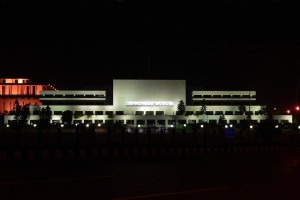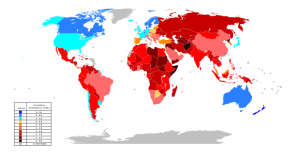An End to Horse Trading in Pakistan
A lack of transparency continues to be a major issue in Pakistani politics, Pakistan has struggled in hosting democratic elections vote buying and electoral fraud dominates as issues in a majority of polls. Pakistan’s Internal State of Affairs

Pakistan had a violent year in 2013 when Nawaz Sharif won the elections and the Pakistan Muslim League took over the government. Mass protests erupted across the nation, called the Azadi March, organized by the opposition party, the Pakistan Tehreek-e-Insaf Party. The Taliban and their affiliates also targeted the elections through bombings and targeted killing campaigns. The military’s inability to protect its civilians from extremist Islamist groups have enhanced security crisis within the nation. Militant groups have continued to target and kill hundreds of Shia Muslims. Other religious minorities have also been victims of violence. Christian communities were also targeted when 81 were killed recently in a church bombing in Peshawar.
Nawaz Sharif and the Pakistan Muslim League
Pakistan’s bicameral federal legislature consists of the Senate and the National Assembly. The president of Pakistan is also a major component of the Parliament. Mr. Nawaz Sharif is the 18th and current Prime Minister of Pakistan, holding office since June, 2013. The new Pakistan Muslim league replaced the Pakistan People’s Party-led government which was in office since 2008 and it was the first constitutional transfer of power from one civilian government to another in Pakistan’s history. Mr. Sharif is the president of the Pakistan Muslim League, which is currently Pakistan’s largest political party with 186 seats in the National Assembly of Pakistan. Sharif and his opposition, Imran Khan have been in a brawl over the 2013 elections, which were allegedly rigged. Sharif has also been criticized for running a system of patronage where his family members were readily appointed into the parliament.In addition, Sarif has been in and out of the Pakistani government while reforms remained stagnant.
Pakistan’s Senate
During the General elections on May 11, 2013, 272 of the 342 seats in Pakistan’s National Assembly were up for reelection. These members were elected in Pakistan’s four provinces, Islamabad Capital Territory, and other tribal areas. Only Muslim voters are allowed to vote, but non-Muslim voters have 10 non-Muslim member seats between the parties.
Pakistan’s Vote Banks

Elections in Pakistan have traditionally been controlled by massive vote banks, headed by power brokers known as “Big Men”. These “Big Men” usually sell votes to the highest bidders. Votebanks consist of loyal voters from a single community, who consistently back a political party or a person in exchange for certain benefits. Votebanks have frequently been a cause of unfair elections in Pakistan’s election history with most participating individuals having a narrow understanding of the political situation. Parties get their votes in exchange for public goods or money. Vote banks usually have been controlled through bribery, violence, and patronage and threatening democracy throughout the country. Religious groups and ethnic parties have been known to for their vote bank involvement in urban regions. For example, Imran Khan of the Pakistan Tehreek-e-Insaf (PTI) party has been known for his vote bank in Kirachi, polling over 50,000 votes in at least one National Assembly constituency during the 2013 elections. The government usually has taken a blind eye on this. As such, religious and ethnic groups have been able to control Pakistani politics through such means.
Constitutional (22nd Amendment) Act, 2015
After the controversy of the 2013 elections rooted behind vote banks, Prime minister Nawaz Sharif has called for an end to the “undemocratic practice of horse-trading” in senate polls. He further said that transparency is extremely necessary for reforms and democracy will only flourish if such acts of buying and selling of votes is stopped. Three new amendments are being considered in order to implement ethical elections. An open voting policy in place of the previous secret ballot policy has been included in the draft law.. The PPP and several other smaller parties have expressed their opposition to these proposed change, arguing that the issue of vote buying should be an internal party issue. As such, whether this fulfills its intent of bringing more honesty into Pakistan’s election system remains uncertain.
